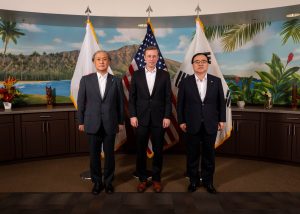Seoul’s National Security Advisor Kim Sung-han met his U.S. and Japanese counterparts on Thursday at the headquarters of the United States Indo-Pacific Command in Honolulu, Hawaii. It is the first in-person trilateral meeting between the security chiefs since South Korean President Yoon Suk-yeol took office in May.
Amid the growing North Korean nuclear and missile threat, the trilateral and bilateral meetings of the security chiefs were held in order to reaffirm the joint and united response.
“If North Korea conducts its seventh nuclear test, the corresponding measure would be completely different,” Kim said after the trilateral meeting on Thursday.
Kim also pointed out that his counterparts, Jake Sullivan and Takeo Akiba, agreed to respond to the North’s nuclear test in a serious manner.
While reiterating Seoul’s hawkish stance on the North’s nuclear and missile threats, Kim emphasized that “the trilateral cooperation of the U.S., South Korea and Japan would be maximized, with the coordination with the international community, to make North Korea realize that it was a wrong decision” if it conducted the nuclear test.
Kim also told reporters that the three security chiefs discussed the corresponding response measure to a possible seventh nuclear test concretely but refused to share details.
Last month, Yoon publicly showed a dovish overture toward North Korea with his “audacious initiative,” an economic package as inducement for Pyongyang’s denuclearization. Unlike his earlier hawkish remarks, including a preemptive strike option against the North, which he aired during the presidential campaign, Yoon has initiated a two-pronged approach to bring the North Korean leader Kim Jong Un back to the negotiating table. Regarding Seoul’s new approach to dismantling North Korea’s nuclear arsenals and denuclearizing the peninsula, Kim said that Sullivan and Akiba showed a considerably positive reaction to it and agreed to closely coordinate to motivate North Korea to accept Seoul’s offer. However, Yoon’s “audacious initiative” is unlikely to yield progress soon.
Kim Yo Jong, the powerful sister of Kim Jong Un and the main voice on inter-Korean relations, published a statement days after Yoon proposed his initiative. She belligerently criticized it with North Korean-style provocative words.
In the statement, Kim Yo Jong made clear that there would be no dialogue and cooperation with the Yoon administration while likening Yoon to a “knave” and denouncing Seoul’s attempts to denuclearize North Korea. She also stated that Yoon’s bold “audacious initiative” is a copy of the previous Lee Myung-bak administration’s “Opening and 3000” plan – which had failed to deter the North’s nuclear and missile developments. As key policy advisers for the Yoon administration also worked for the Lee administration, experts had already anticipated that Yoon’s policy on North Korea would be an updated version of Lee’s.
Seoul expressed regrets over Kim Yo Jong’s statement as it and its ally, the U.S., are still seeking room for dialogue to renew the stalled nuclear talks. The extended joint military exercises between the U.S. and South Korea, which Pyongyang deems one of the pair’s “hostile policies,” formally ended on Thursday. North Korea may now be ready to show off its advanced missile programs such as intercontinental ballistic missiles and submarine-launched ballistic missiles.
Officials in Seoul and Washington have repeatedly said that Pyongyang is in the final stage of planning for a seventh nuclear test, indicating that Kim Jong Un can carry out the test anytime he wants. However, as one of the most important events this year for China – the 20th National Congress of the Chinese Communist Party – is scheduled on October 16, Pyongyang might not make any provocative moves that could disrupt Chinese leader Xi Jinping’s historic moment.

































